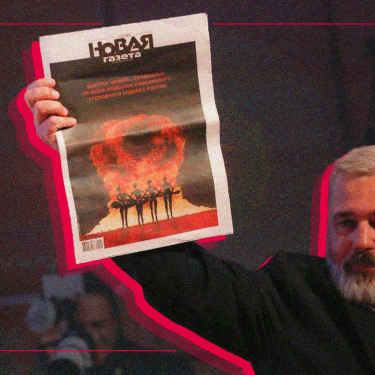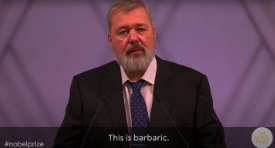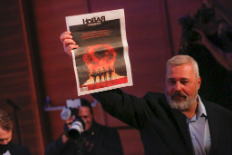From Nobel laureate to “foreign agent” – Russian censorship's attacks on Dmitry Muratov and Novaya Gazeta

The fate reserved for Novaya Gazeta, the flagship of Russian independent journalism, and Dmitry Muratov, its former editor, illustrates the scale of the draconian censorship imposed by Vladimir Putin since launching his invasion of Ukraine. Reporters Without Borders (RSF) looks back at ten key moments in the past 20 months of repression and resistance.
"Deeply marked by a history of bloodshed, Novaya Gazeta has always recovered from the murders of its journalists and other painful episodes in the persecution it has had to endure. Its fate today reflects the nightmare that has descended on independent Russian journalism. Since Vladimir Putin launched his war in Ukraine, Novaya Gazeta's staff have had to divide, hide and constantly reinvent themselves in order to pursue their vital journalistic mission.”
1) 10 December 2021: “This prize is dedicated to true journalism. It is dedicated to my deceased colleagues at Novaya Gazeta – Igor Domnikov, Yuri Shchekochikhin, Anna Politkovskaya, Anastasia Baburova and Stas Markelov, Natalya Estemirova.” On the podium in Oslo where he received the Nobel Peace Prize, Dmitry Muratov paid tribute to the six Novaya Gazeta employees who have been murdered because of their work. This iconic newspaper's editor and Philippine journalist Maria Ressa were awarded the prize jointly for their "courageous fight for freedom of expression.” In Muratov's case, the award was also a nod to history: the last Russian to win it, the Soviet Union's last leader, Mikhail Gorbachev, used part of the prize money to help launch Novaya Gazeta in 1993.

2) 24 February 2022: In the days following Russia's large-scale attack on Ukraine, the climate of confusion and terror did not spare Novaya Gazeta. On the day after the invasion, the newspaper published a special issue in Russian and Ukrainian, but it was quickly overtaken by the imposition of systematic censorship. Realising that it had become impossible for journalists to provide reliable and accurate reporting on the war without being imprisoned, the newspaper decided to terminate all coverage of the war, even deleting some of its archives.
3) 28 March 2022: After another warning from the media regulator, Roskomnadzor, the newspaper decided to stop publishing its print edition until the end of the “special military operation.” For several days, the noose had been tightening around Novaya Gazeta – copies of the newspaper had disappeared from newsstands, and subscribers have been finding threatening letters in their mailboxes. To signal his opposition to the invasion of Ukraine, Dmitry Muratov announced that his Nobel Prize medal would be auctioned off for the benefit of Ukrainian children.
4) 7 April 2022: Former Novaya Gazeta journalists who had to flee to Riga launched a news website called Novaya Gazeta Europe (access to which was blocked in Russia three weeks later). The same day, an unidentified person threw red paint at Dmitry Muratov while he was on a train to Samara, covering him and his clothes with what appeared to be in blood and causing his eyes to burn. A far-right Telegram channel claimed responsibility for the attack, which it said was to avenge Russia's “great patriots.”

5) 15 July 2022: Novaya Gazeta announced the creation of a monthly magazine entitled NO, consisting of contributions from journalists remaining in Russia. The first issue explored the secrets of Vladimir Putin's regime and its authoritarianism. The NO website was blocked seven days and nine hours after it went online.
6) 5 and 6 September 2022: The precautions taken by Novaya Gazeta did not stop the censorship steamroller. The licences of the print versions of Novaya Gazeta and NO were rescinded at Roskomnadzor's request. On 13 September, the newspaper was given a heavy fine for “discrediting the Russian army.” And finally, on 15 September, the Novaya Gazeta website's licence was revoked. Challenged by Novaya Gazeta, these decisions were confirmed on appeal in the months that followed. Without a licence, Novaya Gazeta cannot publish more than 999 copies. To keep reporting, it offers PDF versions of its newspapers on its website, which can be accessed within Russia by means of a Virtual Private Network (VPN).

7) 29 June 2023: Just over a year after its creation, the Russian authorities declared Novaya Gazeta Europe to be an “undesirable organisation.” Since then, all of its employees and all those who “participate” in the organisation or share its content online have risked being imprisoned.
8) 4 July 2023: Elena Milashina, a Novaya Gazeta reporter who was awarded the RSF Prize for Courage in 2020, was the victim of a vicious attack when she went to Chechnya to cover the trial of the mother of the founders of an opposition Telegram channel. After intercepting the car in which she and lawyer Aleksandr Nemov were travelling shortly after they left Grozny airport, her assailants beat her, broke her fingers, shaved her head and covered it with a green antiseptic. She was hospitalised in a serious condition and was evacuated to Moscow that evening. Despite this attack, the latest of several, she returned to Chechnya at the beginning of September to continue covering the trial.

9) 15 August 2023: In an account published in the Riga-based Russian exile news site Meduza, former Novaya Gazeta reporter Elena Kostyuchenko revealed that she was poisoned in October 2022 in Germany, the country where she thought she had found a safe refuge, and that she was still suffering serious physical and mental aftereffects more than nine months later. She had covered the first weeks of the Russian war in Ukraine for Novaya Gazeta. She had to flee the field in the face of threats from Russian forces, who were planning to kill her.
10) 1 September 2023: Dmitry Muratov was branded a “foreign agent” by the Russian authorities, joining the list of 235 journalists and media outlets already bearing this defamatory label, which imposes draconian administrative obligations and the requirement to precede every publication, including online text, audio or video posts, with a long, large-font statement self-identifying as a “foreign agent.” Non-compliance is punishable by a heavy fine or even imprisonment for repeat offenders. To protect Novaya Gazeta from these obligations, Muratov resigned as editor on 4 September.
